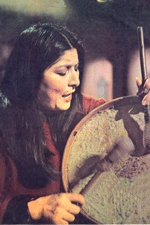Mercedes Sosa - When the singer is silent, life is silent too
 Mercedes
Sosa represents more than a great popular artist for the Latin-Americans.
This extraordinary woman, whom we consider part of ourselves, without
even being related to her, has left our world, but her voice still
remains. We have lived right beside her, sharing happiness and sadness
altogether.
Mercedes
Sosa represents more than a great popular artist for the Latin-Americans.
This extraordinary woman, whom we consider part of ourselves, without
even being related to her, has left our world, but her voice still
remains. We have lived right beside her, sharing happiness and sadness
altogether. The artist Mercedes Sosa has always had the audience with her, many friends and artists, even in the last moments of her life. Among these friends, the TV show 'Latin America presents itself ', which also brings homage to the one who was called 'The Voice of Latin America" or simply 'La Negra".
Mercedes Sosa was born on July 9, 1935 in San Miguel de Tucumán (Argentina) in a poor family of labourers. She started her career in Mendoza, but her actual launch in music was in Cosquin, during the best known Latin American folk music festival, when Jorge Cafrune, one of the most popular singers at the time, invited her to sing with him. At the time, there was a very important cultural movement in Mendoza. For Mercedes Sosa, this period was the happiest. She married Oscar Matus, composer of Argentinian folk music, with whom she had a son.
In 1962 she met poet Tejada Gomez, one of the founders of the nueva canción movement, who brought a different approach to folk music. This movement spread in all Latin America and Europe.
The 70s represented a crucial stage in Mercedes Sosa's life; it was then that she met composer Pocho Mazzitelli and entered more thoroughly the Argentinian cultural life. A few years after Mazzitelli's death, Mercedes Sosa underwent a dark period of loneliness and depression.
In 1979, after recording Serenata para la tierra de uno, during a show at Mar de Plata, the police came and arrested the audience and the artist. Her exile in Europe (Paris and then Madrid) followed subsequently.
In 1982, after the debacle of the military dictatorship, Mercedes Sosa came back to Argentina and to the cultural life, promoting less known artists such as the Cubans Silvio Rodriguez and Pablo Milanes, founders of the movement Nova Trova Cubana, or her fellow compatriots, Victor Heredia and Teresa Parodi. She also got close to famous rock music singers such as Leon Gieco, Charly Garcia, Luis Alberto Spinetta and Fito Paez. She sang with Luciano Pavarotti, making quite an impression on Italian, German and French people
. She spent more than 40 years on stage, becoming 'cultural ambassador" of her country. Her musical heritage consists of 50 albums, 6 films and hundreds of concerts around the world. Among her best known songs one can mention Si se calla el cantor (When the singer is silent), composed by Horacio Guarani, Gracia a la vida (Thank you life) by the Chilean singer and writer Violeta Parra, Alfonsina y el mar (Alfonsina and the sea) by Ariel Ramirez, Cancion con todos (A song for everyone) by the Argentinian composer Cezar Isella and many other songs one can listen during the TV show 'Latin America presents itself".
In 2000, Mercedes Sosa won the Latino Grammy award for the perfomance of the song called Misa Criolla, written by Ariel Ramirez, a mix between religion and folk. This piece has known different versions, one of them being performed by the Madrigal Choir in Bucharest.
This year Mercedes Sosa got threee nominations for the first volume perfomed with renown singers from Latin America - Cantora 1, for 'Best album of the year", 'Best cover design" and 'Best folklore album".
After her death, Diego Fischerman, the Argetinian musicologist, stated: ' 'She fostered the type of artist with whom the mimesis with the audince was fundamental. A course of more than 40 years which defines, on one side, an unique musician possesing a voice rich in nuances and an extraordinay phrasing and, on the other side, a perfectly and well defined illustration of the folklore song as landmark of her time.
Her biographer and close friend Rodolfo Araceli published in 2003 the book Mercedes Sosa. La Negra, in which we find details from the life of the singer, whose unique voice reached even the coldest of hearts. Argentina is not the only one that mourns her, the entire American continent does. For everyone, there is an empty space left behind her.
Mecedes Sosa died on October 4, 2009.
May her soul rest in peace!
Author: Wladimir Pesantez
Translated by Pop Olivia and Sinziana
Mihalache
MA students, MTTLC, Bucharest University
Back to Archive
2009














